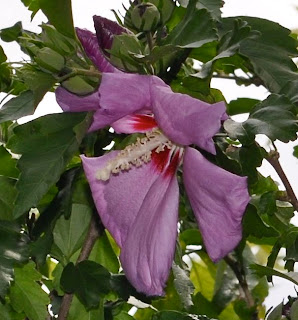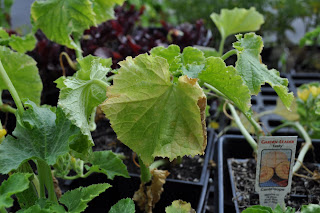While I was there the peacock felt compelled to defend his territory.
I had been listening to eulogies on the radio about Senator Robert Byrd, who has died. That makes him one of the luckiest bastards ever to have lived on earth.
Anyone who has been able to enjoy the supreme peak of civilization's comforts and bow out before having the crushing, horrendous knowledge that said civilization has managed in its greed and hubris to destroy the ecosystem and indeed even a habitable climate for his children, never mind grandchildren, is lucky.
How I envy them for escaping not just the fetid end of the world as we have known it, but even just the knowledge that it is to be the fate of our species - forget the great great great grandchildren - they won't exist...
The lily leaves looked normal last year, but this year, they share the symptoms of exposure to toxic ozone that afflict every other leaf.
As it happens, the irreplaceable RPauli sent me this link from an NPR broadcast, in which Dr. Margaret McGrath from Cornell infers that a "potentially fatal" fungus is killing basil in gardens from New York to Florida. Maybe there is such a fungus. However, the leaf damage of stippling and chlorosis described is identical to the symptoms of ozone exposure that every other plant, not just basil, currently exhibits.
And so, even though I've been avoiding nurseries (the whole notion that crops are failing has me feeling uneasy, to say the least), upon reading the transcript I promptly visited my local farmstand, to examine the plants, and take photographs of them. Sure enough, the basil for sale, which had only been potted up 3 weeks ago, is in the early stages of chlorosis - discoloration from an inability to photosynthesize and produce chlorophyll - and stunted, curling foliage.
But then, by an amazing coincidence, so did every other herb have its own version of Dr. McGrath's "fungus"! For anyone who isn't already familiar with the impacts of ozone on vegetation, Basic Premise is a good place to start, and this post has pertinent excerpts from the EPA website's compilation of research.
But back to our farm stand, where mint leaves had spots, and curly parsley was lacking chlorophyll,
just like the flat Italian parsley. Not very appetizing! Last time I bought dill to put in gazpacho, it had all the flavor of grass.
Thyme leaves were yellowing.
A cantaloupe vine with leaves as weak as these is not going to produce much by way of melons.
And this pepper plant will not be producing many peppers later in the season when leaves are already so discolored in June.
Not only were their leaves rumpled, shriveled, yellow and singed,
but their flowers were lacking their normal bright hues - and their veins stand out prominently against the thin tissue of their petals. All well-known symptoms of ozone poisoning and, allow me to point out, these are all plants in pots, in presumably enriched soil - not impacted by acid rain or drought.
The Rose of Sharon flowers are emerging limp and at least a month too early.

The iris leaves are in far worse shape than last year.


The iris leaves are in far worse shape than last year.

But then, so is everything else. It is astonishing to me, even though I predicted it!

I wake up early whether I need to or not, when the sky is just starting to lighten, and the quiet of the hollowing world is punctuated by a few songs from lonely birds.


I wake up early whether I need to or not, when the sky is just starting to lighten, and the quiet of the hollowing world is punctuated by a few songs from lonely birds.

The first thought in my mind every morning now is that we have destroyed the Earth, and every time, I contemplate that notion with fresh shock.


what to make for breakfast for the kids, or what to plant in the garden, or how in love I was, or how upset I was about something that never really mattered much, and now matters not at all.


Even many - I would say most - of the scientific experts from whom I have learned about tipping points and amplifying feedbacks, still seem to retain some hope we can avert total catastrophe - even though there is no factual basis to have any.


Some think that we are so clever that we cannot possibly sow the seeds of our own destruction - it just seems inconceivable, impossible...ridiculous!
Others understand that there is runaway heating already in the pipeline, that has only been masked thus far by sinks like the ocean and forests, which are failing. The true heating effect from over a century of anthropogenic greenhouse gas emissions will soon (perhaps this summer) be unleashed - but they cling to the hope that we will discover some clever mechanism to slow and eventually halt and reverse the trend.


I found this Wendell Berry poem from "Leavings" in a comment left at Climate Progress by a member of an irrepressibly but highly commendable hopeful project:
"Let hopelessnessShrink us to our proper size.Without it we are half as largeAnd the worldIs twice as large. My smallPlace grows immense as I walkUpon it without hope."
And looking for a reference on the web I came across more of this Kentucky farmer's poetry - and now of course I shall have to obtain his whole oeuvre, and confess I feel quite ignorant not having known about it before.
"The young ask the old to hope. What will you tell them?Tell them at least what you say to yourselfBecause we have not made our lives to fitour places, the forests are ruined, the fields eroded,the streams polluted, the mountains overturned.Hopethen to belong to your place by your own knowledgeof what it is that no other place is, thisplace that you belong to though it is not yours,for it was from the beginning and will be to the end."
I used to be passionate about politics and first thing I would tune in to the early radio show Morning Edition.


But now I hardly pay any attention to debates about health care policy, the latest military adventure, or conflict in the MidEast.


There will be wars between nations, and wars between neighbors, and none of them will produce any more water or food. There will be no victors.


The real war has already been lost, and we will all be refugees without resources, reserves, or recourse.


SFGate blogger Yobie Benjamin links to the story about crop damage in Tennessee, speculating it results from the oil spill, and/or the use of corexit, the dispersant used by BP in the Gulf.
Mr. Benjamin, you stated:
"There is no other explanation for the crop damage."
This is actually incorrect. There is another more likely explanation, which is the toxic ozone created every day when fossil and biofuels are burned, releasing volatile organic compounds into the atmosphere every day. In fact the inevitably, inexorably rising levels of tropospheric ozone are killing trees which have had decades of exposure. Just because ozone is invisible, unlike the oil in the Gulf, it is pure, lethal poison causing cancer, emphysema, and asthma, as well as crop damage, from California to Maine which predates the Gulf spill.
This information has been demonstrated by voluminous publications of scientific research but is practically a taboo subject, since the only way to stop the ecosystem from crashing is to stop burning fuels which should be rationed & reserved for essential purposes only while we transition to clean energy sources.
"There is no other explanation for the crop damage."
This is actually incorrect. There is another more likely explanation, which is the toxic ozone created every day when fossil and biofuels are burned, releasing volatile organic compounds into the atmosphere every day. In fact the inevitably, inexorably rising levels of tropospheric ozone are killing trees which have had decades of exposure. Just because ozone is invisible, unlike the oil in the Gulf, it is pure, lethal poison causing cancer, emphysema, and asthma, as well as crop damage, from California to Maine which predates the Gulf spill.
This information has been demonstrated by voluminous publications of scientific research but is practically a taboo subject, since the only way to stop the ecosystem from crashing is to stop burning fuels which should be rationed & reserved for essential purposes only while we transition to clean energy sources.
I started this blog because I wanted people to learn that our activities are killing trees. Since then the carnage is rapidly spreading to include essential crops, and birds are disappearing as their sources of food evaporate.
On the way home last night, I saw this lone wild turkey in a field. It should be in a flock.
































I can agree with the outcome (very bad) - but we do not know the timeline. Granted that the rate of change has been increasing... and it still is going to take 50 to 100 years just to affect a greenhouse gas.
ReplyDeleteIt may be late, but it is not too late.
Oh jeekers.
yeah though I liked this post a lot and linked it to my brother, Gail cheer up! I think the revised DSM5 http://www.dsm5.org/Pages/Default.aspx says one more blog post like this and it's prozac mandatory (kidding). Also didn't know you didn't know Wendell Berry an AMERICAN TREASURE. Well (deep subject) if he can write about you so can you. Bravo!
ReplyDeleteHaha, when I first learned about climate change I figured that sooner rather than later there would be a psychiatric label for the anxiety produced by such knowledge. My favorite is: Climate Change Derangement Syndrome" first discovered here (http://biglizards.net/blog/archives/2009/02/climate_change_1.html),
ReplyDeletewhere its pernicious underlying agenda is described thusly: "The position -- and I believe the underlying purpose -- of AGCC advocacy from the beginning has been creeping socialism and the destruction of Capitalism, the market, and national sovereignty..."
Turkey hens don't typically flock in June. They mate in May and she probably has poults or even eggs on a nest somewhere.
ReplyDelete